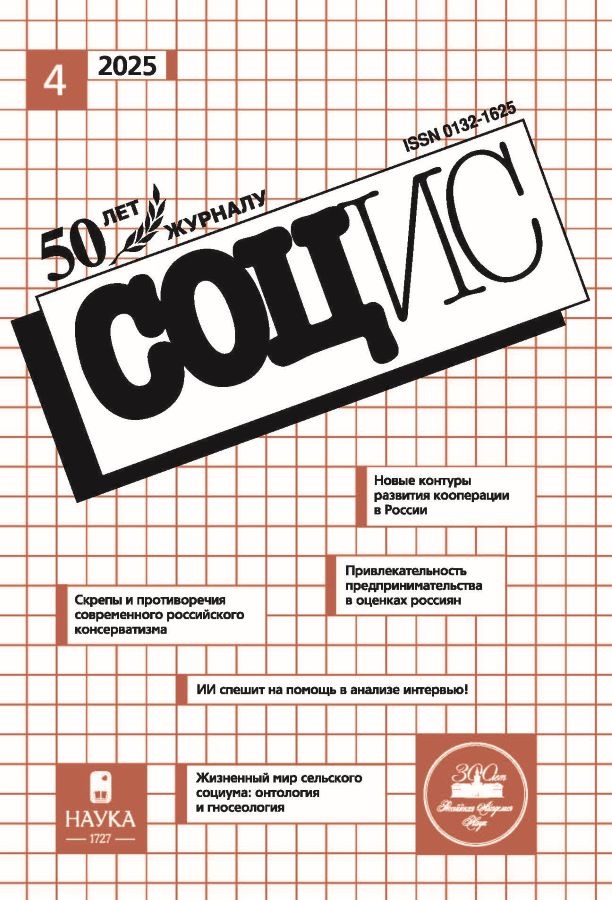PUBLIC HEALTH AND SALUTOGENESIS
- Autores: ZHURAVLEVA I.V.1
-
Afiliações:
- Institute of Sociology of FCTAS RAS, Moscow, Russia
- Edição: Nº 4 (2025)
- Páginas: 123-134
- Seção: SOCIOLOGICAL JOURNALISM
- URL: https://bakhtiniada.ru/0132-1625/article/view/309427
- DOI: https://doi.org/10.31857/S0132162525040114
- ID: 309427
Resumo
There is a need to identify ways and means to improve public health, which receives significant attention at the level of developing the legislative framework. But actual public health indicators show a number of problems. One of them is the formation of a healthy lifestyle for Russians, a necessary culture of health. A new scientific direction in the field of health, salutogenesis (“the origin of health”) is associated with the analysis of factors that determine physical and mental health in conditions of an insufficiently favorable external environment. This involves studying the health of healthy people, aimed at developing a person’s self-confidence, an active attitude to life, and a sense of responsibility for one’s health. The aim of the article is to include the topic of salutogenesis into scientific debate. Salutogenesis has become most widespread in a number of countries in the form of the salutogenic design concept, aimed at making people active creators of their own lives, able to use internal resources. In Russia, salutogenesis is realized in the activities of the “Healthy Cities, Districts and Towns” Association, in the existence of a number of scientific and educational departments in various cities.
Palavras-chave
Sobre autores
I. ZHURAVLEVA
Institute of Sociology of FCTAS RAS, Moscow, Russia
Autor responsável pela correspondência
Email: zhuriv@mail.ru
Moscow, Russia
Bibliografia
- Antonovsky A. (1984) The Sense of Coherence as a Determinant of Health. Advances, Institute for Advancement of Health. Vol. 1. No. 3: 37–50.
- Antonovsky A. (1987) Unravelling the Mystery of Health: How People Manage Stress and Stay Well. San Francisco: Jossey-Bass.
- Antonovsky A. (1980) Health, Stress, and Coping. San Francisco: Jossey-Bass Publishers.
- Antsiferova A. A., Lopatina M. V., Kontsevaya A. V., Ipatov P. V., Drapkina O. M. (2024) Assessment of the Level of Health Literacy, Including Vaccination, Fmong the Working Population of the Russian Federation Based on the Results of a Survey on the Atria Platform. Kardiovaskulyarnaya terapiya i profilaktika [Cardiovascular therapy and prevention]. No. 23(8): 4112. (In Russ.)
- Baraboshina A. A. (2022) Resilience and Salutogenesis and their Interrelation in the Learning Process. Pedagogy and psychology of modern education: Theory and practice: materials of the scientific and practical conference “Ushinsky Readings” / under the scientific editorship of I. Y. Tarkhanova. Part 1. Yaroslavl: RIO YGPU: 146–151. (In Russ.)
- Bochaver K. A., Danilov A. B., Nartova-Bochaver S.K., Kvitchast A. V., Gavrilova O. Ya., Zyazina N. A. (2019) Prospects of a Salutogenic Approach to the Prevention of Burnout Syndrome in Russian Doctors. Klinicheskaya i special'naya psihologiya [Clinical and Special Psychology]. Vol. 8. No. 1: 58–77. (In Russ.)
- Chernyshev V. M., Strelchenko O. V., Mingazov I. F. (2021) Consequences of Healthcare Reform in the Russian Federation (1990–2020). Problems and suggestions. Orgzdrav. Vestnik. Novosti, mneniya, obuchenie [Orgzdrav. The messenger. News, opinions, training]. VSHOWS No. 2. (In Russ.)
- Dorogina A. S. Sokolova M. S. (2015) Principles of Salutogenesis in the Design of Medical Real Estate. In: VII International Student Scientific Conference. Student Forum – 2015. Moscow. (In Russ.)
- Frankl V. (1990) Man in search of meaning: collection. Moscow: Progress. (In Russ.)
- Gable S., Haidt J. (2005) What (and Why) Is Positive Psychology? Review of General Psychology. Vol. 9. No. 2: 103–110.
- Greenberg J. (2002) Stress Management. 7th ed. St. Petersburg: Piter. (In Russ.)
- Kasatkina V. L. Shcheplyagina L. A. (eds) (2005) Health. Educational and methodological manual for teachers of grades 1–11. Moscow: Education and health. (In Russ.)
- Kozyreva P. M., Smirnov A. I. (2020) Dynamics of self-assessments of Russians’ health: current trends of the post-Soviet period. Sotsiologicheskie issledovaniya [Sociological Studies]. No. 4: 70–81. (In Russ.)
- Lopatina M. V., Popovich M. V., Kontsevaya A. V., Drapkina O. M. (2021) Determinants of Health Literacy: Results of the First Population-Based Study in the Russian Federation. Profilakticheskaya medicina [Preventive Medicine]. No. 24(12): 57–64. (In Russ.)
- Maddi S. (1987) The Hardiness Enhancing Lifestyle Program for Improving Physical, Mental and Social Wellness. National Wellness Institute.
- Maslow A. (2008) Motivation and Personality: trans. from English / 3rd edition. St. Petersburg: Peter. (In Russ.)
- Onishchenko G. G., Popova A. Yu. eds. (2023) The History of Sanitary Education in Russia. Monograph. St. Petersburg: Science-intensive technologies. (In Russ.)
- Shelegova D. A., Lopatina M. V., Chigrina V. P., Samofalov D. A., Medvedev V. A., Tyufin D. S., Kontsevaya A. N., Deev I. A., Drapkina O. M., Kobyakova O. S. (2023) Assessment of Public Health Literacy, Including Navigation Literacy. Moscow. (In Russ.)
- Tillich P. (1995) Selected: Theology of Culture. Moscow: Lawyer. (In Russ.)
- Twille P. S., Sevanyan L. G., Trunkova K. S. (2025) From Theory to Practice: the Historical Development of the Concept of “Salutogenesis” and the Introduction of Salutogenic Design in Medical Organizations in the Context of Increasing Patient Orientation. Zdorov'e megapolisa. [Megalopolis Health]. No. 6(1): 108–118. (In Russ.)
- Udovichenko E. V., Gorban I. G. Malyutina M. V., Grebennikova V. A. (2022) A Salutogenic Approach to Physical Education as a Promising Model of Students’ Motor Activity and Their Health. Vestnik Orenburgskogo gosudarstvennogo universiteta [Bulletin of Orenburg State University]. No. 1 (233): 59–66. (In Russ.)
- Zhuravleva I. V. ed. (2014) Student health: а sociological analysis. Moscow: INFRA. (In Russ.)









